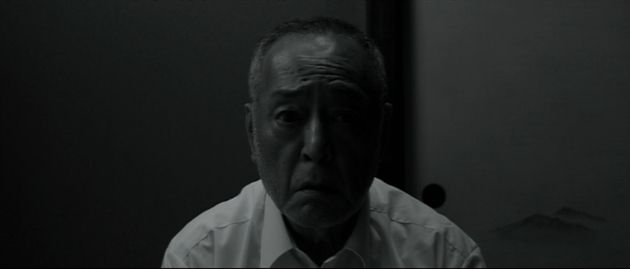
How do you proceed making a film about Japan's recent tragedies- first, the crippling recession that forced 31,650 Japanese into taking their own lives in 2010, then the horrific Tsunami and Fukushima nuclear meltdown a year later, that took about 20,000 lives? One of the modern masters of Japanese cinema, Kobayashi Masahiro (Bashing, Haru's Journey) teams up with the legendary actor Nakadai Tatsuya (Yojimbo, Ran, Harakiri) again in an austere, emotionally devastating film that takes place in one location, shot in monochrome static long takes. It's a fitting film to an immeasurable grief that the battered nation must have been suffering for the last few years.
Frail Murai Fujio (Nakadai) is discharged from the hospital. He has lung cancer and without further treatment, he won't last 3 months. But that's too long of a wait for him. With his wife Yoshiko passed on a year ago, he wants to die. Against his unemployed, divorced son Yoshio (Terajima Tenobu)'s wishes, Fujio nails the doors and windows shut in his room and refuses to budge from his seat in front of the portrait of his dead wife. He grimly jokes that he will become a mummy. He warns his son that under no circumstance that he should come into the room. The idea is, after his death, Yoshio can continue to live off of his pension for a year without reporting his passing. As Fujio sits motionlessly, memories of good times and bad times appear and disappear in his mind.
Yoshio has had his share of tragedies. The prolonged unemployment led him to drinking. His wife and daughter left him and went back to her home town in the northwest, only to go missing after the devastating tsunami and Fukushima disaster. With everyone he loves gone, and the only family left being his sick, suicidal father, things really can't be any more hopeless. Even in his dire circumstances, Yoshio shows resilience, proving his survival instinct is still there, perhaps because his father has none left.
Based on a real life story about a pension scamming scandal in 2010, the tragedy befallen on the Murai family can also be used for describing the desperate situation that millions of other middle-class Japanese families have found themselves in.
Kobayashi's strength has always been portraying the realistic side of life with a sobering eye while not losing humanism in his characters. Even though Kobayashi's usual style does not reflect a typical Japanese family drama in the tradition of Ozu, he pointedly chooses to be minimalistic with Japan's Tragedy. All the interior, static misé-en-scene is unmistakably reminiscent of the old master, especially in flashback sequences which take place at and around the dining table.
The film's black and white cinematography and use of the off-frame spaces by Ooki Sumio is masterful. The cold stillness and somber greys provide the film its weight but also, strangely enough, comfort. The effectiveness of a color sequence near the end: the happy days of Murai family really broke my heart. Not only is it a complete contrast to the rest of the film, but it illustrates the fragility of human life with such a simple method.
Once again, Nakadai proves that there is no other actor on earth who could portray grief better without overacting. Kobayashi knows this and makes full use of the close-up of Nakadai's face as he stares into camera in silence in many long takes. Terajima Tenobu is equally good as a stand-in for the millions of middle-aged men and women, a generation which is perhaps going through the darkest time in Japanese history since WWII.
Emotionally and physically austere, Japan's Tragedy is not an easy film to watch. But it's a beautiful tribute to the people who've been suffering through so much grief.
Japan's Tragedy will be showing July 21 as part of Japan Cuts 2013. For more info and tickets please visit Japan Society's website.
No comments:
Post a Comment